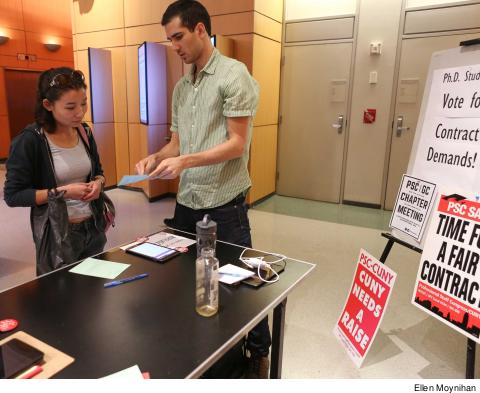The current collective bargaining agreement between the PSC and CUNY expires November 30, and the union is organizing a member-driven contract campaign.
 |
The union’s bargaining team met over the summer to prepare for contract talks with CUNY. The union is committed to begin bargaining as soon as possible, as early as the end of October. (Under the Triborough Amendment of the state’s public employee labor code, contract terms are automatically extended past their deadline if no new agreement is reached.) The PSC constitution requires that delegates approve the list of demands before it is presented to management, an atypically democratic procedure in the labor movement, and the bargaining team intends to bring its proposed demands to the Delegate Assembly on October 19.
The union’s bargaining team, which is drawn from among members of the PSC Executive Council, represents the union’s diversity, and has full-time and part-time faculty representatives from both senior and two-year colleges, as well as higher education officers, a college laboratory technician and a graduate employee.
The union activists spent the summer reviewing past contract demands and considering prospective demands, and union leadership is optimistic that negotiating the next contract will not take as long as it did last time. The previous delay in negotiations with CUNY came at a time when then-New York City Mayor Michael Bloomberg and Governor Andrew Cuomo refused to allocate money for collective bargaining, followed by a set of contracts for state unions that included years without any wage increases. CUNY, for its part, simply refused to put any financial offer on the table.
FEWER DELAYS
This year, the bargaining climate is different. Two state unions, the Public Employees Federation and the Civil Service Employees Association, have settled contracts with 2-percent annual wage increases. The United University Professions, which represents SUNY faculty and staff, was still in contract talks as Clarion went to press.
The momentum from major victories in the last contract should also work in the PSC’s favor. In the last round of negotiations, the union pressed hard for more job security for adjuncts, resulting in a historic pilot program providing multiyear appointments for part-time teaching faculty. As the semester began, the union confirmed that approximately 1,500 adjuncts had received for three-year appointments.
Members of the bargaining team are energized. “We’ve had a very productive year because we’ve made such important gains,” said HEO chapter chair and bargaining team member Andrea Vásquez. “That’s been really beneficial for this contract because we can look at how it went, look at how these demands were met and how they were implemented.”
Under the terms of the existing contract, Vásquez and her chapter have trained more than 80 members who now serve on HEO labor-management committees to address how members can attain the newly negotiated $2,500 salary differential. The experience of working in labor-management groups around the university has energized the chapter’s membership for the upcoming contract campaign, Vásquez said.
She added, “For the next contract, we’re looking at how we can improve upon these gains. We’re looking at what we won and how we worked, and how things could have been made easier or clearer for members.”
Luke Elliott-Negri, the Graduate Center PSC chapter chair who is part of an advisory group on the needs and concerns of part-time instructional staff members, including graduate assistants, has organized tabling at the Graduate Center so he and other GC chapter activists can meet with as many rank-and-file members as possible about the contract.
“We want to engage with members,” Elliott-Negri said. “It’s really to make sure that people are aware of the breadth of contractual provisions and issues.”
In an interview with Clarion, PSC President Barbara Bowen underscored that gains for the PSC at the bargaining table in the last round were important, not just for PSC members, but also in fighting austerity in public higher education.
“Some of the most important advances against austerity for CUNY have been made through the bargaining process,” Bowen said. “Changes like 80 percent paid sabbaticals, junior faculty released time, the HEO professional development fund, the adjunct paid office hours – all those are ways of reducing austerity conditions that would otherwise prevail at CUNY.”

